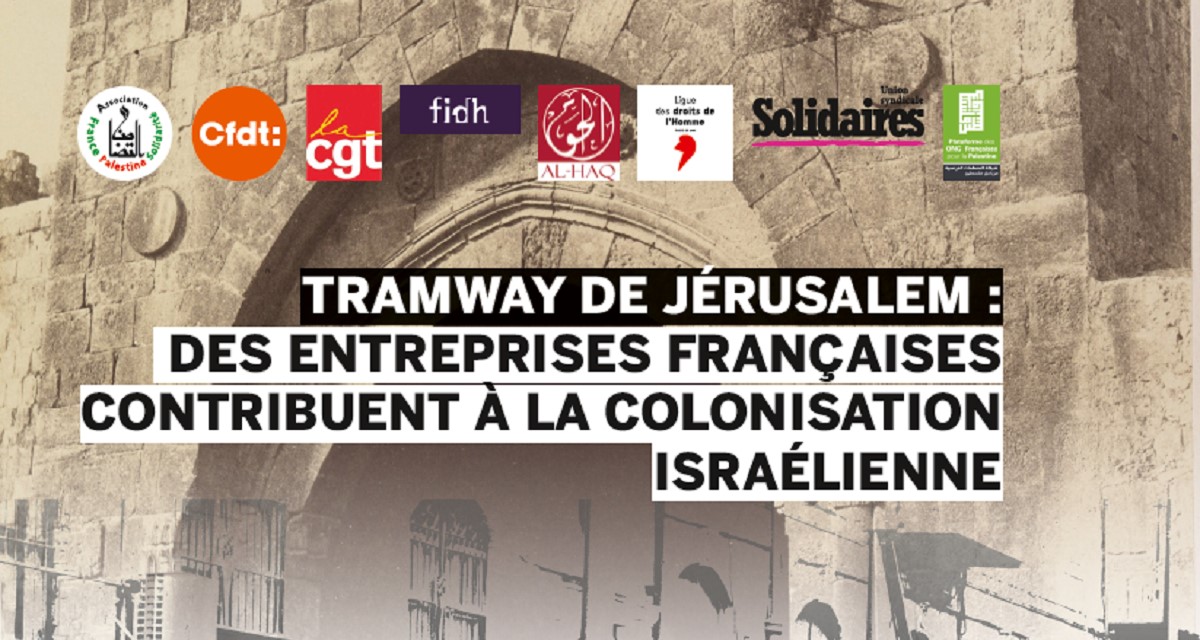The United Nations published on Wednesday, February 12, a much-delayed and contentious report listing 112 companies doing business with Israeli projects in the Occupied Palestinian Territories (OPT). The UN Human Rights Council (OHCHR) earned praise from Israeli human rights groups and Hadash (The Democratic Front for Peace and Equality – Communist Party of Israel) for releasing its long-anticipated report detailing companies that participate in Israeli economic initiatives in the territories it has been occupying since the June 1967 war.
Israel’s far-right Netanyahu government widely condemned the publication of the list, claiming that the move reflects the bias of the UN against Israel, and totally ignored the content of the OHCHR report.

The cover of a report prepared by French and Palestinian unions and human rights organizations disclosing the French companies, particularly Alstom, that built and are continuing to expand the Jerusalem light railroad which encroaches on parts of occupied East Jerusalem. The title reads: Jerusalem Light Rail: The French Businesses Contributing to Israel’s Colonization. (Photo: CGT)
Of the 112 companies listed in the document, 18 are international enterprises that conduct business operations in settlements across the occupied West Bank and East Jerusalem; among them are Airbnb, Booking.com, Alstom, Airbnb, Expedia, JCB, Opodo, TripAdvisor and Motorola Solutions.
According to the OHCHR, the companies appearing in the list have facilitated the construction of settlements, supplied surveillance equipment for them, or provided security services to enterprises operating there. Israeli settlements in land occupied by Israel in the 1967 war are deemed illegal under international law. Other categories of economic involvement mentioned in the report include supplying equipment for the demolition of housing and partaking in practices that “disadvantage” Palestinian businesses via the use of restrictions of movement.
Commenting on the release of the list, a Communist Party of Israel spokesperson, said the release of the list by the UN was “significant but incomplete. No one who is Palestinian would or should accept the perpetuation of occupation. The only acceptable outcome continues to be via [implementation of] all UN resolutions.”
Saeb Erekat, secretary general of the Palestine Liberation Organization, said that publication of the list “enhances and consolidates the credibility of the Human Rights Council [OHCHR] and international organizations in the face of the fierce attack and the intense pressure that the Trump administration places on these institutions.”
Erekat, who called upon all companies “to end their complicity in the denial of our inalienable right to self-determination,” stressed that, “It is our firm belief that accountability and justice are essential requirements for peace. This database is the first concrete step towards holding Israel accountable for its illegal colonial-settlement enterprise during more than half a century. It should serve as a reminder to the international community of the importance of strengthening the tools to implement international law at a time when the illegality of Israeli settlements is being challenged by those calling for the perpetuation of Israel’s control over the land, natural resources and the people of Palestine.”
Publication of the list came a day after the Palestinian Authority president, Mahmoud Abbas, denounced the imperialist Trump administration’s plan for Middle East in an address at the UN in New York. The plan would allow Israel to annex about 30% of the West Bank, including all its settlements there, while offering the Palestinians chunks of territory connected by tunnels and bridges that they could call a state.
To download a Microsoft Word file of the OCHRA report on business activities related to Israeli settlements in the Occupied Palestinian Territories, visit the Human Rights Council website, and scroll down to A/HRC/43/71. Alternatively, click here.


